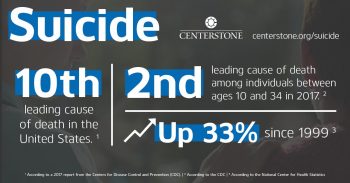Home / Health & Wellness Articles / Suicide Prevention /
What to Know about Young Adult Suicide

The young adult years often represent the prime of life — a time filled with fun and new experiences. But they can also be marked by challenges or stress in school, with friends and at home. Tragically, many young people are taking drastic action in response to what are likely short-term struggles. Suicide is now the second leading cause of death among ages 15 to 24.
September is National Suicide Prevention Awareness Month. With more knowledge about suicide prevention methods and available resources, we are better equipped to make a difference and ensure young lives are not cut short. With the upsetting trend of increased suicide rates among youth and young adults in mind, here are several points to know and share.
Signs of Suicidal Thinking – It can be hard to discern between typical adolescent angst and behaviors that would indicate a young person is considering ending his or her life. But some actions just shouldn’t be overlooked.
Take it seriously if a young person: threatens to hurt or kill oneself; seeks access to weapons or drugs; expresses feelings of hopelessness; engages in risky or unsafe activities; increases alcohol or drug use; withdraws from friends and family; exhibits rage; talks or writes publicly about death. If these actions are displayed, it’s time to have a conversation.
How to Start the Conversation – First, it is extremely important to acknowledge individuals who are exhibiting behavior that may indicate suicidal ideation. Acknowledge you have heard or seen a concerning comment or action. Then ask direct questions and invite the person to share their feelings. Listening actively, avoiding judgements, and taking the person seriously are very important steps.
Beyond listening, take actions to ensure your friend or loved one feels supported. Encourage and/or assist them in seeking help from a trained mental health professional. Engage the person in working to reduce access to weapons, pills or other harmful items. And continue to stay engaged in their life, regularly checking on them.
Where to Seek Help – Centerstone operates a 24-Hour Crisis Hotline at (800) 681-7444 where trained mental health professionals are always available to listen, assess next steps and connect the caller to local emergency resources as needed.
Additionally, behavioral health providers are encouraged by recent investments that have been made to enhance suicide prevention efforts focused on young adults. Centerstone, for example, recently received funds to train and engage pediatricians as well as college and university campus leaders in the role they may play in suicide prevention.
In this Suicide Prevention Awareness Month, be aware of how to help — and share what you know. So often, it’s truly a matter of life and death.
Becky Stoll, LCSW, is vice president for crisis and disaster management for Centerstone, overseeing the organization’s suicide prevention efforts, 24-hour Crisis Call Center, Mobile Crisis Response Teams and Crisis Management Strategies.


